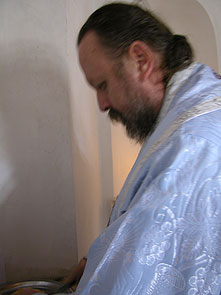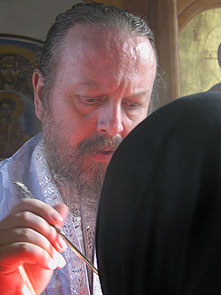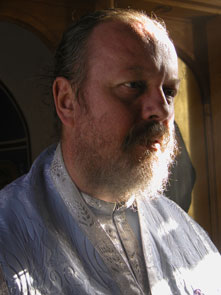The harvest truly is plentiful, but the laborers are few… ( 21.01.2008 )
Today, on the feast day of Saint Gregory, Bishop of Ohrid and Saint George the Chozebite, Metropolitan Nahum of Strumica celebrated Divine Liturgy. But when He saw the multitudes, He was moved with compassion for them, because they were weary and scattered, like sheep having no shepherd. Then He said to His disciples, “The harvest truly is plentiful, but the laborers are few. Therefore pray the Lord of the harvest to send out laborers into His harvest” (Matthew 9:36-38). In the interpretation of today’s Gospel reading, His Eminence said: “What must the Godman Christ be thinking about today’s harvest and today’s laborers? And, if he was moved then, when He was personally with them, what must He be feeling now? Starting from myself, it is hard for me even to think about this. On the other hand, though, it is the only proper way of reading the Gospel: one to start from oneself, constantly to check with the Gospel firstly and solely oneself. The Gospel of Christ is ever current… Yet, what do the words of the Lord mean, that the harvest is plentiful but the laborers are few? The first part of the sentence surely is clear to all. It takes only reckoning up the number of them who were baptized Orthodox Christians that are present at the Divine Liturgy on Sunday (the day of the Resurrection) or on some feast day, and we will realize how small this number is. Moreover, if we consider the number of the present who take living participation in the Holy Eucharist, through Communion of the Holy Mysteries, we will see this number is simply disappointing. Therefore did the Lord Jesus say to the Apostles, “Go rather to the lost sheep of the house of Israel” (Matthew 10:6). The same call is current in the present, too, because the vast majority are merely nominal and solely by name Orthodox Christians, and there are few who properly struggle. Let us not forget here that the harvest encompasses all people, from the beginning to the end of the world and age; of all the nations, of all the races, of all ages, of all confessions… The true problem is located in the second part of the sentence: but the laborers are few! What does Christ want to say with this ‘few’? Now, let us say then there were truly few laborers in terms of number; but today, when we see often in our midst gospel laborers, how can we possibly think they are few? The Lord wants to say there are few who properly struggle. There are few whose priestly rank corresponds to their inner spiritual state. The shepherd is recognized by his flock, the tree—by its fruit (Matthew 7:16-20). For wherever the carcass is, there the eagles will be gathered together (Matthew 24:28)… Some wise man has said something like this: the easiest way for one to condemn himself is to write—that is, when he writes, he does exactly that. The previous is completely in line with the Gospel: “For by your words you will be justified, and by your words you will be condemned” (Matthew 12:37). It is well known that the Holy Fathers in their spiritual struggle have observed three levels of spiritual development, and have handed them down to us as their spiritual experience: ‘purification of the heart’, ‘illumination of the mind’, and ‘deification’. We find this division in many of the Fathers, although there can be given various names. Saint Nicetas Stethatos, for example, says there are three stages in the advancement towards perfection: ‘initial state of purification’, ‘transitional state of illumination’, ‘mystical state of perfection’. In the theology of Saint Maximus the Confessor, these three stages are represented as ‘practical philosophy’ (purification), ‘natural contemplation’ (illumination of the mind), and ‘mystical theology’ (deification). These stages of spiritual growth we find in Saint Isaac the Syrian named as ‘repentance’, ‘purity’, and ‘perfection’. As this Holy Father says, repentance is: to stop with one’s former sinful way of life and not to regret it. Purity is: a heart filled with compassionate love for all creation. There is something that must be emphasized here: purity is not only the awareness that we have been freed from this passion or other; purity is a fruit of repentance. If after repentance we acquire purity, this purity is true in Jesus Christ only if we have a heart with love for all people. And, eventually, comes perfection, which is humility, and this means: renunciation of all visible things, and likewise of all mental things, and abiding (in God) beyond all these things, without ever thinking about them. Now, what must shepherds know, or they who wish to become that? The Fathers demand that the rule be respected, according to which the reception of priestly ranks must correspond with the three stages of spiritual growth. Let us recall: there are three degrees in the priestly rank, those of a deacon, presbyter, and Episcope. These three degrees correspond to the three stages of spiritual development: ‘purification of the heart’ (praxis), ‘illumination of the mind’ (theoria), and ‘deification’ (theology). Saint Maximus draws a parallel between the three stadiums of spiritual life and the three degrees of priesthood. This Holy Father writes: “He performs the work of a deacon who trains his mind for sacred feats and expels from himself the passionate thoughts; the presbyter’s work is done by him who illumines his mind in the knowledge of the created beings, thus destroying false knowledge (of the intellectuals); whereas, the Episcope’s work accomplishes he who prefects his mind in the sacred peace of the knowledge of the worshipped and Most Holy Trinity.” In Saint Dionysius the Areopagite’s writings On Ecclesiastical Hierarchy there are also three stages of spiritual life described. They are named ‘purification’, ‘illumination’, and ‘perfection’ (deification), and are associated with the three degrees of priesthood: “Episcopes completely possess the power of illumination… Their task is not only to illumine, but also to perfect. Priests are illumined and illumine, while deacons purify and have the ability of discernment. Briefly, the ability of the good Shepherds to spiritually guide towards illumination and perfection, along with the participation in the Holy Mysteries of the Church, purify, illumine, and perfect (deify) the people of God. If, though, we do not bring into line our personal state and the ecclesiastical state of affairs with the Holy Fathers’ teaching, we can neither expect any better results in our pastoral work. The Episcopes of the Orthodox Church will continue occupying themselves mainly with vainglory (with politics and ethnophyletism), its presbyters will continue occupying themselves mainly with avarice, while the rest of the people will continue occupying themselves—some (the nominal ones) mainly with fornication and others (spiritually not properly guided ones) mainly with slander, lying, judging, and condemnation (of the Episcopes, presbyters, and each other)… To end with: what does that mean, “Freely you have received, freely give” (Matthew 10:8)? Well, firstly the shepherd—since this applies to him—must know what he receives and what he gives… Secondly, when one created receives the uncreated thing he will realize that whatever he might have done to get it, he has truly received it for free. Then he will also realize that he can only give it for free… They who view the creation from the perspective of the Heavenly Kingdom look at it with a different eye then they who view it from the perspective of earth, mud, and worms. Lord, have mercy…!



